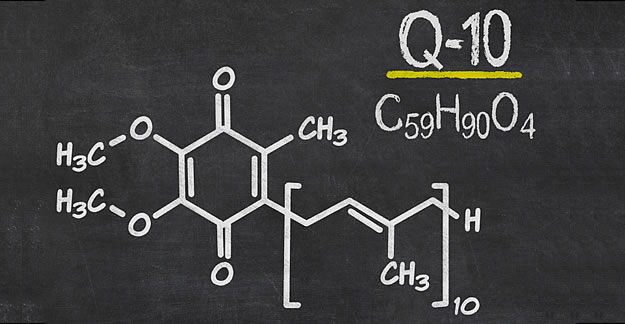Americans spend more than $40 billion on vitamins and supplements each year, and increasingly coenzyme Q10 (CoQ10) is making its way onto their shopping lists. Devotees of the supplement say it can lower blood pressure, reduce migraines, improve symptoms of Parkinson’s and depression, ward off dementia, and even halt the aging process. There are naysayers who say these claims are overblown, and research reviews reporting that evidence can’t yet make a sufficient claim. Also, for those taking a wide range of medications — including drugs for diabetes, blood thinners, and beta-blockers for high blood pressure — CoQ10 may need to be avoided.
If you’re curious about this trendy drug, then keep reading. Below, we give you the full 411 on CoQ10 so you can decide for yourself it’s worth taking.
Browse This Article
What is CoQ10?
Coenzyme Q10 occurs naturally in the body and serves a number of purposes, including supporting cell function and acting as a natural antioxidant. Ubiquinol, the natural compound that is considered the more easily converted form of CoQ10, is required for 95 percent of people’s cellular energy production.
“It’s the strongest lipid-soluble antioxidant available, protecting your body’s cells from harmful oxidative stress,” says Dr. Adam Splaver, MD, a cardiologist based in Hollywood, FL. “Without proper ubiquinol levels, your body produces less energy and may be more susceptible to cellular damage from free radicals that can threaten a healthy heart or your immune system and energy levels.”
“CoQ10 functions as an antioxidant,” echoes Abby Wadsworth, MS, RD, owner of Whole Health Nutrition in Williston, Vermont. “It’s concentrated in organs that have a higher energy requirement, including the heart, liver, kidneys, and pancreas.”
How to Eat for More CoQ10
While CoQ10 appears naturally in the body, some people do not produce enough of this important enzyme and your ability to generate this compound deteriorates as you age. You can also boost your intake of CoQ10 by eating foods high in the coenzyme such as oily fish (such as salmon and tuna), organ meats (such as liver), and whole grains. Here’s a chart of other foods high in CoQ10.
| Food | Serving | Coenzyme Q10 (mg) |
| Beef, fried | 3 ounces* | 2.6 |
| Herring, marinated | 3 ounces | 2.3 |
| Chicken, fried | 3 ounces | 1.4 |
| Soybean oil | 1 tablespoon | 1.3 |
| Canola oil | 1 tablespoon | 1.0 |
| Rainbow trout, steamed | 3 ounces | 0.9 |
| Peanuts, roasted | 1 ounce | 0.8 |
| Sesame seeds, roasted | 1 ounce | 0.7 |
| Pistachio nuts, roasted | 1 ounce | 0.6 |
| Broccoli, boiled | ½ cup, chopped | 0.5 |
| Cauliflower, boiled | ½ cup, chopped | 0.4 |
| Orange | 1 medium | 0.3 |
| Strawberries | ½ cup | 0.1 |
| Egg, boiled | 1 medium | 0.1 |
| *A 3-ounce serving of meat or fish is about the size of a deck of cards. | ||
| Table courtesy the Linus Pauling Institute, Oregon State University. | ||
According to early research, approximately 14% to 32% of coenzyme Q10 may be lost during the frying of vegetables and eggs, but the coenzyme Q10 content of foods doesn’t change with boiling.
While a balanced diet can help some people maintain good CoQ10 levels, many experts encourage the use of supplements for healthy individuals over 50, for people with particular health conditions or those taking certain medications. While CoQ10 supplements are generally well-tolerated, they can cause nausea, diarrhea, and insomnia, particularly at high dosages. Some people are also allergic to ubiquinol and should seek immediate medical attention if they experience difficulty breathing, tightness in the chest, hives, rash, or swelling of the mouth, face, lips, or tongue.
CoQ10 is available as in hard shell and soft gel capsules, an oral spray, and tablets. Recommended dosages vary widely though healthy adults taking CoQ10 as a dietary supplement are usually advised to take between 30 and 200 milligrams per day.
Potential Drug Interactions
CoQ10 may be both beneficial and harmful in cancer treatments. For example, it might help reduce the toxic effects of certain chemotherapy drugs — cerubidin (daunorubicin) and adriamycin (doxorubicin) — on the heart. On the other hand, it’s recommended to not take CoQ10 if you are undergoing chemotherapy or radiation because it may decrease the effectiveness of the treatments.
Some research suggests that CoQ10 might reduce blood pressure, which could possibly enhance the effectiveness of certain blood pressure medications. While this may be a benefit, it’s important to make sure your health care provider is aware that you are taking CoQ10 so that your blood pressure can be closely monitored and your medication adjusted accordingly to avoid low blood pressure (hypotension). Symptoms of low blood pressure include dizziness and fainting. If left untreated, low blood pressure can become life-threatening.
If you’re taking a blood thinner, such as warfarin or aspirin, do not use CoQ10 without consulting your healthcare provider. “CoQ10 can reduce the efficacy of a blood thinner,” explains Splaver. “Therefore, it is important to always inform your physician before you begin any vitamin supplementation and monitor your blood thinner levels a little more often when initiating such therapy.” (See MedShadow’s Next Gen Blood Thinners: What’s Right for You?)
Weighing the Risks & Benefits of CoQ10
Deciding whether to add CoQ10 to your daily health arsenal can be tricky. Levels of CoQ10 produced by the body decrease with aging, and although there is a lack of adequate scientific evidence of benefits of CoQ10, it’s considered safe and possibly beneficial for some conditions.
Here’s a list of conditions that many experts say may benefit from CoQ10 supplementation.
Heart Health
Some heart conditions that CoQ10 may help include congestive heart failure, preventing blood vessel complications caused by heart bypass surgery, and high blood pressure. It assists in maintaining the normal oxidative state of LDL cholesterol, supports circulatory health and optimal functioning of the heart muscle.
In a study of people with high cholesterol, high triglycerides, and a history of heart attack, those taking 200 mg of CoQ10 daily for 12 weeks experienced improvements in blood pressure and serum HDL (“good”) cholesterol, as well as lower LDL (“bad”) cholesterol levels, thereby decreasing the risk of a subsequent heart attack.
Another study published in the journal Interactive CardioVascular and Thoracic Surgery found that patients who took CoQ10 for two weeks before undergoing bypass surgery strengthened the heart and reduced the risk of ventricular arrhythmias post-surgery.
In that same study, the researchers concluded that none of the clinical trials reported any adverse events. However, they point out that better-quality long-term clinical trials need to be done to zero in on the role of CoQ10 for this use.
And according to Splaver, CoQ10 is recommended at times for those patients using cholesterol-lowering statins, such as Crestor (rosuvastatin) and Lipitor (atorvastatin), as these statins lower your natural levels of CoQ10. This drop can lead to muscle aches and pains. (See MedShadow’s Statins: How Safe Are These Life-Savers?)
Immune Function and Inflammatory Pathways
Inflammation is one of the immune system’s first responses to injury or infection. Chronic systemic inflammation is present in many metabolic diseases, including type 2 diabetes, obesity, cardiovascular disease, and nonalcoholic fatty liver disease. A review of nine studies on the effect of CoQ10 supplementation on inflammatory markers revealed that CoQ10 reduced the level of specific inflammatory markers (of which there is nine total) leading to a partial improvement in the inflammatory state of people with metabolic diseases.
Dementia and Alzheimer’s
A study in the journal Atherosclerosis suggests that dementia could be predicted by serum CoQ10 levels. Though several previous studies reported no significant differences in serum CoQ10 levels between patients with and without dementia (including Alzheimer’s disease), this study demonstrates for the first time that a lower serum CoQ10 level is associated with a greater risk of dementia.
Research is underway to investigate the use of CoQ10 for improving cognitive function in healthy older people. The study, conducted by researchers in Australia, will administer 200 mg of ubiquinol or a placebo daily to 128 people age 60 or older over a 90-day period. their cognitive performance will be tested before and after the study period.
Another study explored the use of multiple individual antioxidants, including CoQ10, to help slow the progression of Alzheimer’s disease by targeting oxidative stress. Study authors concluded that the use of antioxidants needs to begin before symptoms of Alzheimer’s appear, and research should focus on the use of antioxidant cocktails rather than a single compound.
Fatigue, Depression, and Migraines
Millions of Americans are affected by fatigue and/or depression each year, and CoQ10 may be able to help.
A 2014 review of the literature on fatigue suggests that low levels of CoQ10 were consistently associated with fatigue. A 2019 study showed that taking 200 mg of CoQ10 three times daily for three months, in addition to patients’ regular disease-modifying drug, improved fatigue, and depression in patients with multiple sclerosis. And yet another study suggests that a combination of several supplements, including CoQ10, can help reduce fatigue and restore mitochondrial function in people with chronic disease.
As for easing migraines, a 2018 study in the journal Nutritional Neuroscience showed that CoQ10 supplementation can improve migraines. In the study, 45 women with episodic migraine took either 400 mg of CoQ10 or a placebo daily, in addition to their regular prophylactic medication, for three months. Those taking CoQ10 experienced significant improvement in frequency, severity, and duration of migraine attacks compared to those taking a placebo.
CoQ10 and Aging Skin
CoQ10 levels in our body’s cells decrease as we age, hence the plethora of anti-aging creams and lotions that tout the benefits of CoQ10. Plus, its antioxidant properties work to eradicate free radicals, which damage cells. But can it actually make you look younger?
Several studies show that CoQ10 does, indeed, work to help combat the signs of aging skin. A study by researchers from the skincare company Beiersdorf tested the effects of topical CoQ10 on 73 women aged 20 to 60. The women applied a cream and a serum containing different concentrations of CoQ10 twice each day for two weeks. Skin samples taken from treated and untreated areas showed that CoQ10 exerted antioxidant effects on surface levels as well as deeper skin levels. The researchers concluded that CoQ10-containing formulas can help improve sun damage and provide anti-aging effects.
How Do I Take CoQ10?
Ideally, you should talk to a healthcare provider or knowledgeable dietician or nutritionist before adding CoQ10 or any new supplements to your regimen. While it’s generally considered to be safe for healthy adults, CoQ10 can be potentially harmful to people with certain conditions or those taking certain medications.
The typical dose ranges from 100 mg of CoQ10 or 25 mg of ubiquinol daily for generally healthy people not taking any medications. (Doses of ubiquinol are lower than CoQ10 because it’s more bioavailable to your body.)
CoQ10 is fat-soluble, so it’s better absorbed by the body if taken with a meal that contains fat. Also, taking it at night may increase your body’s ability to absorb it.
One last important note: Most experts say that CoQ10 supplements should not be given to children 18 and under unless doing so is advised by a healthcare practitioner.







